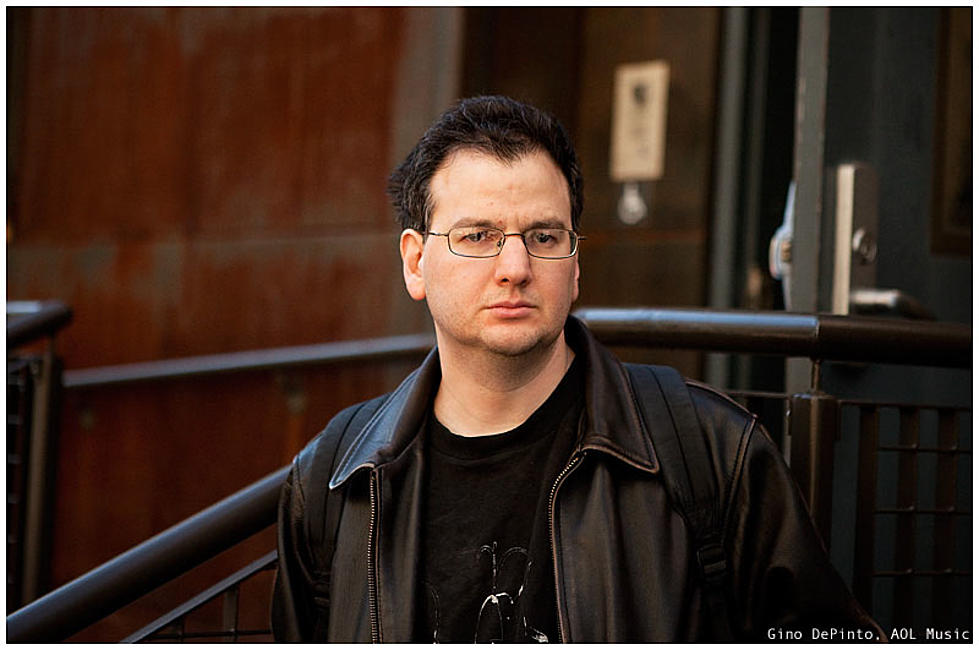Gary Holt: “I had one job in Slayer and one job only. Go out, play killer, bang your head and play a little bit of a guitar hero role. I wear a lot more hats in Exodus”
Gary Holt on life after Slayer, making a triumphant return with Exodus on the ferocious Persona Non Grata, and why you'll reap the rewards if you record song ideas as you go
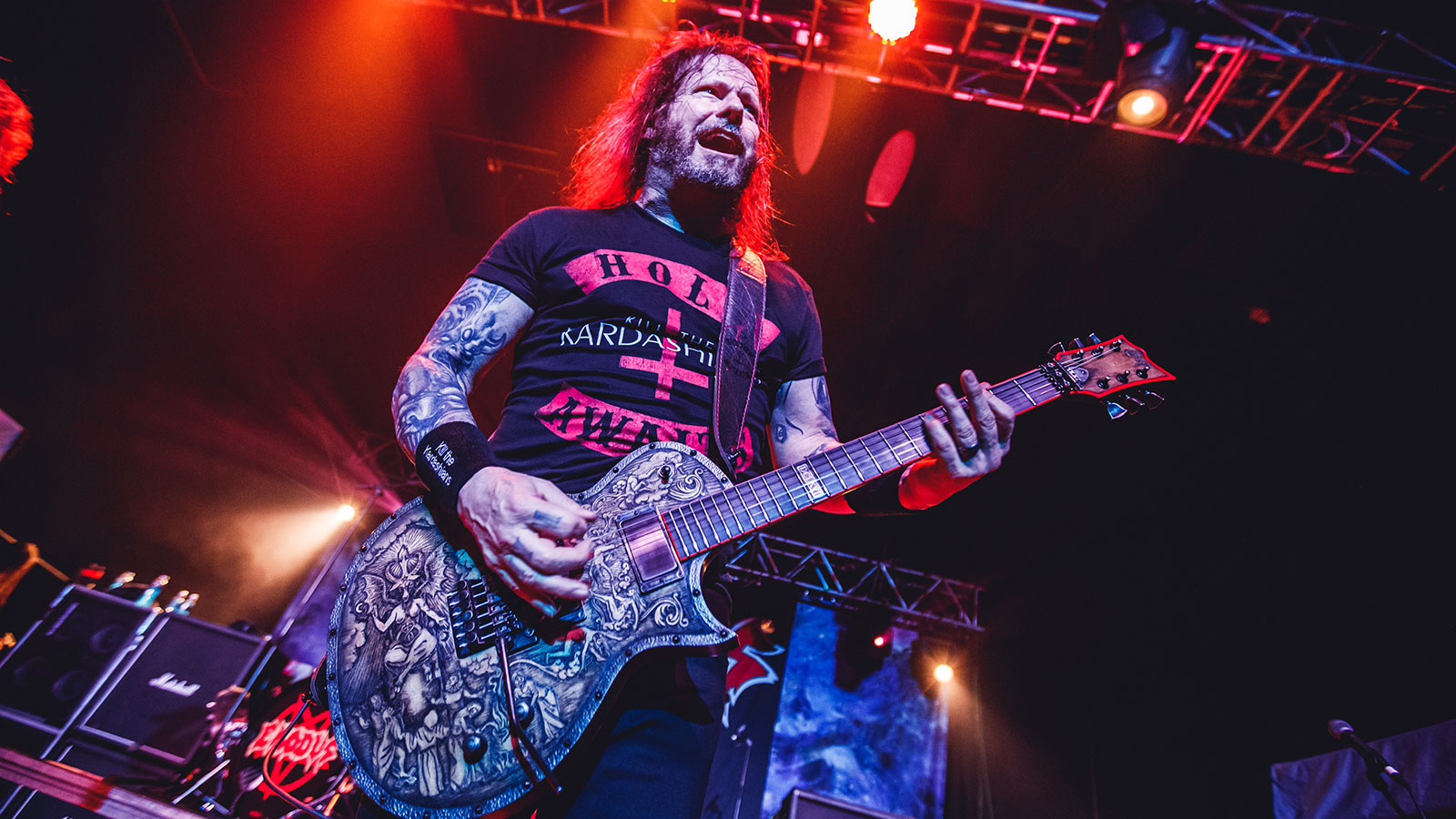
During the last part of Gary Holt’s tenure as Slayer’s second guitarist, he sometimes felt like he was neglecting his main band, Exodus.
As honored as he was to be in Slayer, a group he had loved since their first album, 1983’s Show No Mercy, he wished he had more time to spend with Exodus, the group he had played with since high school and for which he assumed the primary songwriter role after Kirk Hammett left in 1983 to join Metallica.
While Holt wrote and played on all of Exodus’ 2014 studio album Blood In, Blood Out, he couldn’t completely dedicate himself to the group. He missed shows that coincided with Slayer gigs (Heathen’s Kragen Lum filled in on those tours).
And, if Holt hadn’t been in Slayer for nearly nine years, Exodus likely would have released another album between Blood In, Blood Out and their new release, Persona Non Grata.
There’s no question that Holt was a major asset to Slayer when they needed someone to fill in for the late Jeff Hanneman. But some fans and former members of Exodus argue that his years with Slayer jeopardized his main band.
“Slayer were great. They treated me like family from day one,” says Holt from his home in Northern California. “But, yeah, every day there were moments when I missed doing Exodus. The saving grace was that I knew there was a light at the end of the tunnel, and then it would be all Exodus, all the time.
“Plus, I had the support of all my guys. And they had my support to do shows without me and tour regularly. But they’re my brothers and I couldn’t wait to be back. Two months after the Slayer tour ended, I was back on tour with Exodus. I barely even took a break.”
Get The Pick Newsletter
All the latest guitar news, interviews, lessons, reviews, deals and more, direct to your inbox!
Holt’s hunger to return to Exodus shines through the jagged riff shards and crushing rhythms of Persona Non Grata. Rarely has he sounded as joyously entrenched in the band’s visceral mix of aggressive thrash, old-school metal, and deft, fluid leads. In Slayer, he was a hired hand.
In Exodus, his hands define every palm-muted chug, crystalline arpeggio, and tactical rhythm shift. With the exception of Slipping into Madness, which was written by second guitarist Lee Altus, Holt wrote the framework for every song on Persona Non Grata.
“I was so stoked to be doing another Exodus record,” Holt says. “I had no intention of doing anything that wasn’t 100 percent killer. We worked really hard on this album and I think it shows. There’s not one track I’m not totally happy with.”
Unlike the many bands halted in their tracks by the Covid epidemic, Exodus used their time in lockdown to tighten riffs, maximize dynamics and nail the solos. Holt was especially obsessive with his leads.
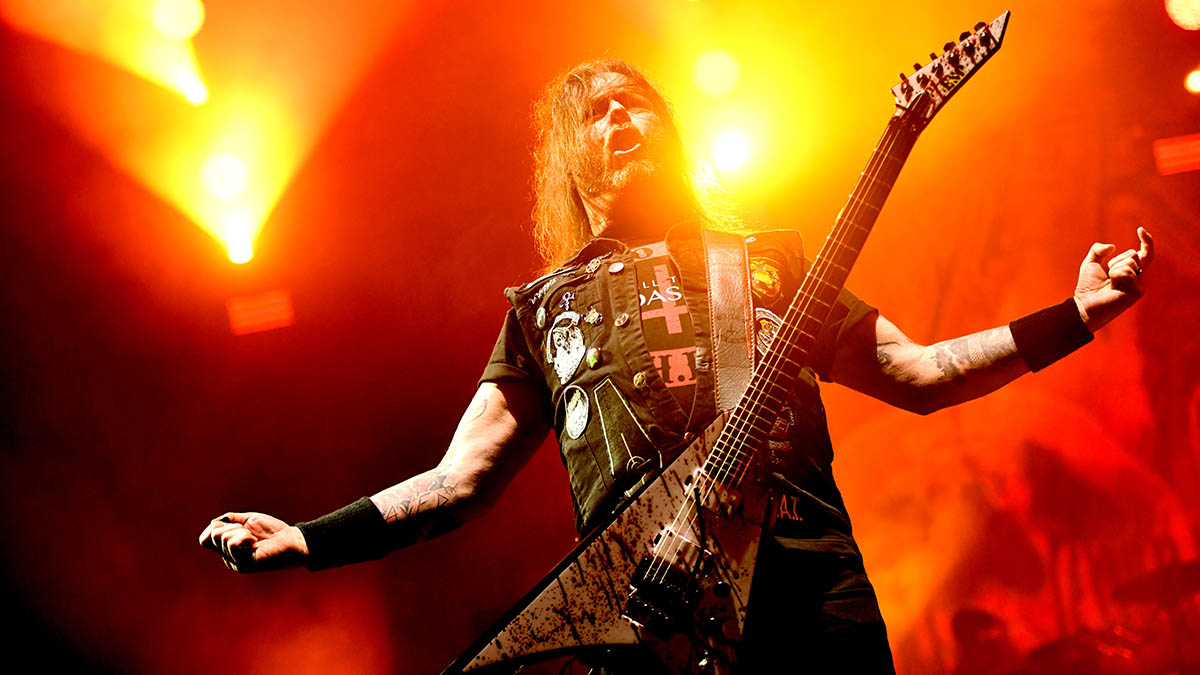
“When it’s time for me to do solos, I sometimes feel super-pressured, and like I’m running out of time because I’m doing so much,” he says from past album experience.
“I’m writing the music, finishing lyrics. I’m there for the drum tracking and then I’m laying down my guitars. I’m there to help Jack [Gibson] work on the bass, I’m working with [Steve] Zetro [Souza] on vocals. So when it comes time for me to do my leads, I feel like I haven’t had any time to work anything out, so I just improvise. This time I had the extra time to really work on my shit so I was super happy with all the solos.”
From a musical perspective, Holt has plenty of reasons to be thrilled with Persona Non Grata, an unrelenting barrage of fire, fury, shock and awe coupled with burrowing guitar earworms.
Holt is even happier that Exodus overcame some harrowing health scares and personal issues some of the members faced between the time Persona Non Grata was finished and the day it came out.
In an in-depth conversation, he discussed the creative process for Persona Non Grata, the one advantage of the Covid lockdown, drummer Tom Hunting’s battle with stomach cancer, his own struggle with alcohol, and how the new album marks a new beginning.
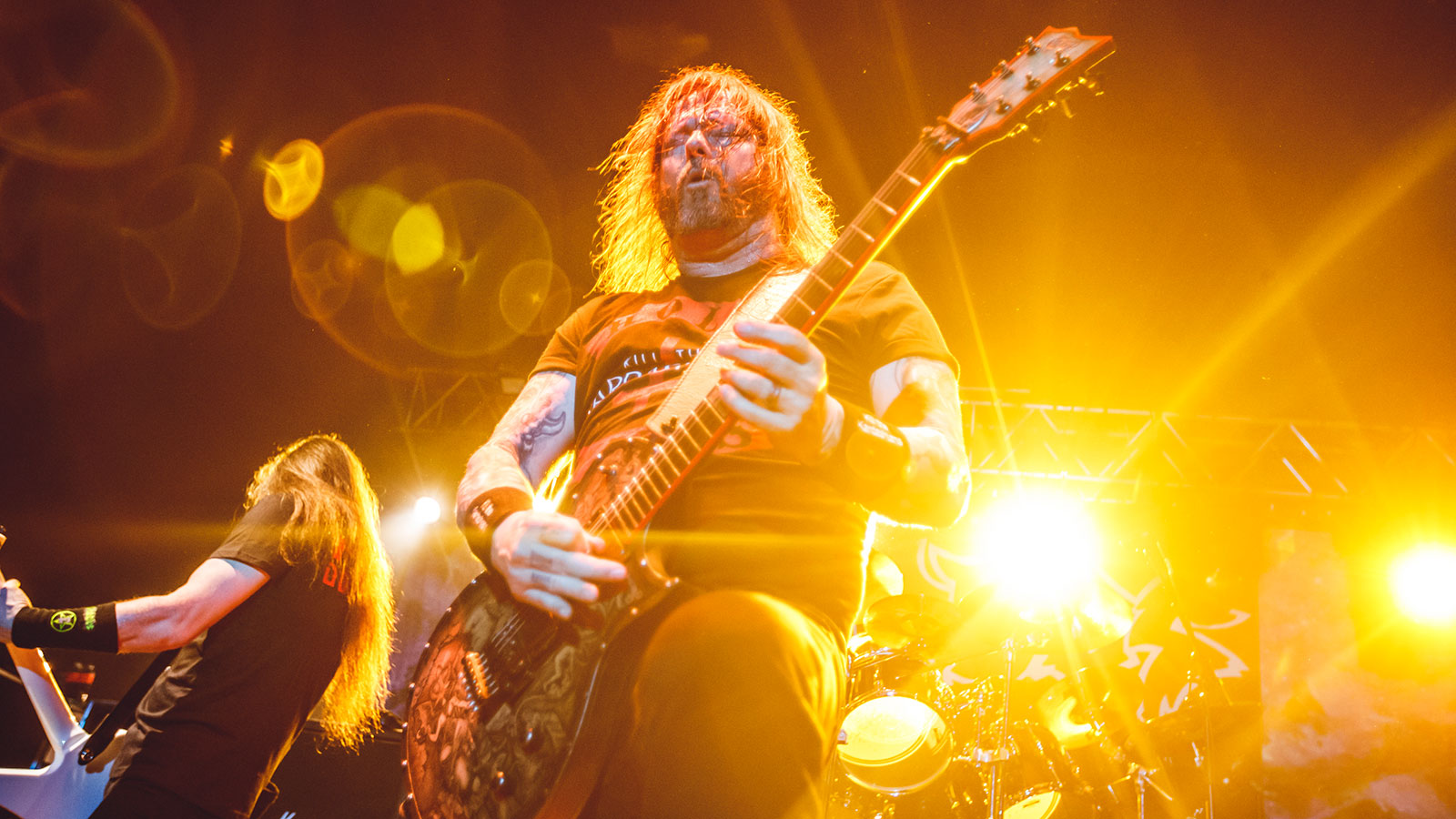
Exodus released Blood In, Blood Out in 2014, which was more than seven years ago. Did you write much of Persona Non Grata between then and the end of the Slayer tour?
“I’m always writing riffs, but I don’t get serious about it until it starts getting close to the time to start working on the next album. Toward the end of the Slayer run, I got more into writing mode. And then when Slayer ended their tour and [drummer] Tom [Hunting] and I got together in July 2020 things started taking shape.”
This time I had the extra time to really work on my shit so I was super happy with all the solos
Did you and Tom work on songs on the fly or did you bring pre-written material into the writing sessions?
“Before we got together, I sent Tom a bunch of recordings of me riffing out on the voice recorder on my iPhone. Some of the songs were pretty much done, some were nearly done, and some were just riff ideas. Then, there were others I thought were done but they ended up completely different. Those kinds of changes happen when you start jamming. So, for a long time it was Tom and me and a half stack and a drum kit in a room just like the way we used to do it back in the day.”
Was locking yourself away with Tom, some electric guitars, amps and a drum kit the way you stayed productive during the lockdown?
“That was one of the beautiful things about Covid. There aren’t many, but it gave us time to work on the sound we wanted, and without interruption, because we didn’t have any summer touring plans.
Tom will convince me to dig back into my phone demos and it ends up being some of the best stuff on the record
“At first, we didn’t think we were going to have time to work on the album at all because inevitably something gets offered to you and you have to take it. You can’t always prepare for it because there are occasions when an artist drops out of a festival, so even if you’re not booked for anything you fill in because the money’s good.
“Or, you have to split the record up into different sessions between tours, which I don’t like to do. We didn’t have any of that. We shipped an entire Pro Tools studio with unlimited inputs to the place we were working up in the mountains and it was awesome. We were uninterrupted for the whole year and we had one sole focus – Exodus.”
Do you delete a bunch of stuff from your iPhone riff bank before you start piecing songs together?
“I keep everything. I always like to have a ton of stuff in there so if I’m working on a new song I don’t even bother looking for particular parts because I get kinda ADD. I’ll write a new riff and completely forget about something else that I wrote that fits right in with what I’m doing.
“I need someone like Tom to hear it and say, ‘Whoa, let’s revisit that.’ I’m like, ‘No, I got other stuff now.’ But he’ll convince me to dig back into my phone and it ends up being some of the best stuff on the record.”
Do you use any recording software or just hold the phone right up to the amp?
“I wrote the whole song Prescribing Horror on my GarageBand program – drums and everything with Toontrack EZDrummer. I’d forgotten all about it. And Tom said, ‘Hey, we should check that one out again’ so we imported everything into ProTools and re-edited it without re-recording it.
“Then we listened to it on real speakers and retracked everything except the clean guitar and the melody solo, which came straight off my GarageBand laptop demo. They sounded fine so we didn’t see any reason to redo them. It wound up being fucking dark and super-scary, which we really liked.”
I wrote the whole song Prescribing Horror on my GarageBand program – drums and everything with Toontrack EZDrummer
Was there a point where you were struggling to find your footing and then the wheels clicked and it was all-systems-go?
“Sometimes that happens. Tom watched me struggle with finishing The Fires of Division for weeks. I just wasn’t happy with it. And then I wake up one morning and start playing, and Tom walks out with a cup of coffee, hears me and goes, ‘That’s it!’ Once I stopped fighting myself and changed the key, it opened the whole song up and I wrote all the other stuff around it. I said, ‘Let’s go out there right now!’ We fired up a click track for it and I just plowed through the whole song, including the ending.
“The whole harmony section was improvised on the spot with a click. I hadn’t written that yet. [Our engineer] Steve Lagudi was about to hit stop, and I said, ‘Don’t hit that button! I’m just rolling with it and I wanna see what happens.’ And I just wrote it on the spot.”
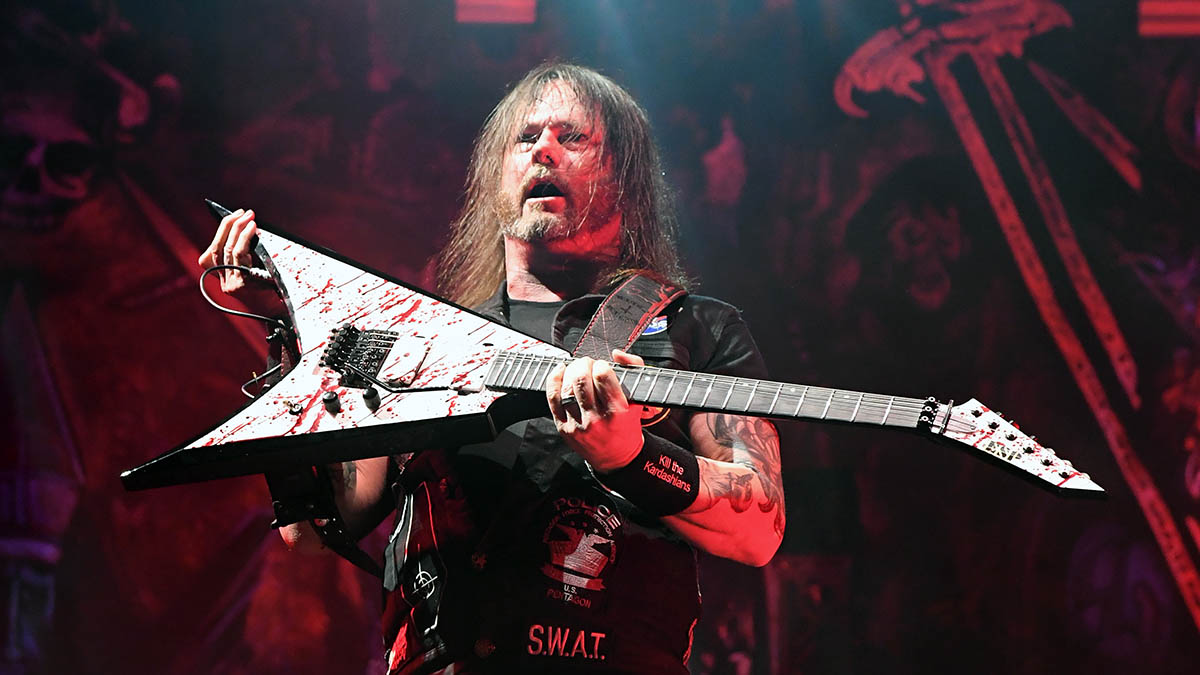
Did you write any of the riffs on Persona Non Grata with the intention of using them for Slayer?
“Not one. This is all 100 percent Exodus. [Slayer guitarist] Kerry [King] wrote all the music on [their final album] Repentless, anyway. None of these riffs were ever submitted or planned for that. I don’t think any of it would really fit in a Slayer song.”
Did it take a little while to get the Exodus machine up and running after prioritizing Slayer for so long?
“It was easy – and we were so into it. Tom [Hunting] and I played music together for 40 years. We have a language that can’t be replicated. So, I was right back at home when we started jamming, and shit started happening right away.”
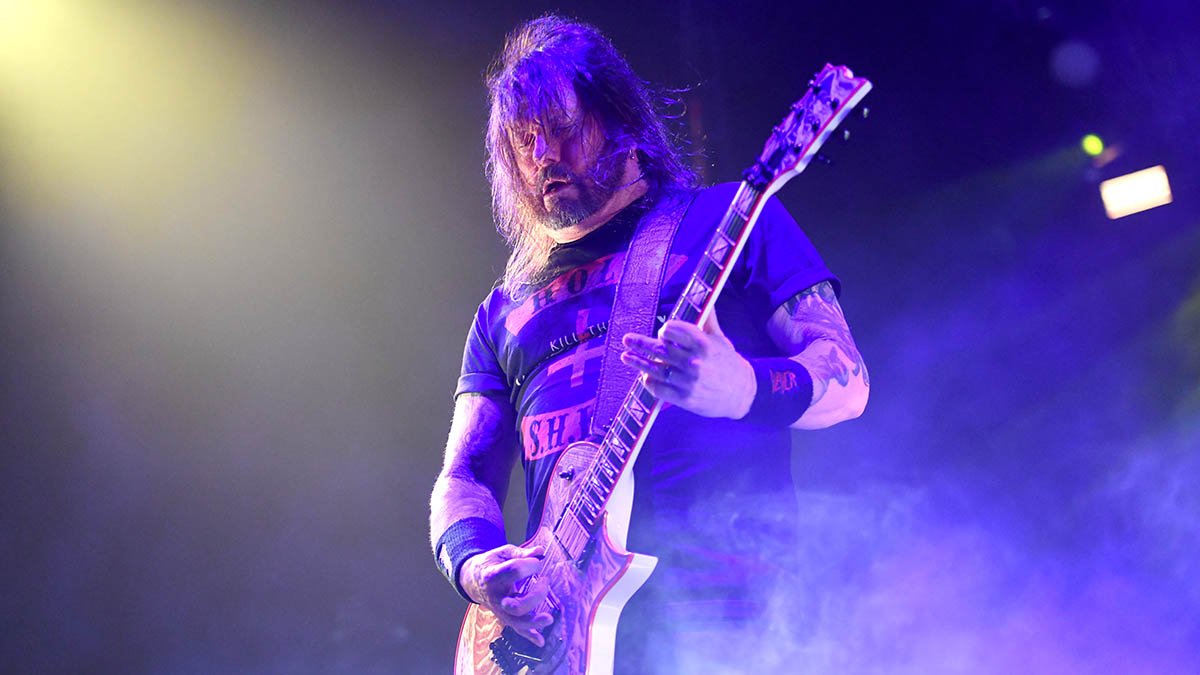
How did your revamped ProTools setup allow you to be more creative and get better sounds?
“A lot of people work with your home-based ProTools interface, and even the really good ones only allow two simultaneous tracks. There’s always one dedicated to the emergency DPI. And that means I’ve only got one mic to work with.
“This time, we were able to try out a million mikes. We ended up going with the most old-school combination of a [Sennheiser MD] 421 and a [Shure] SM57 with a 1980s combo. But we had a dozen mikes up on the two cabs, trying them all out and we could record them all at once and just mute channels and listen to them in the context of the track. It was awesome.”
Did you have “A” and “B” studios going at the same time so Zetro could work on vocals without interruption?
“We had three studios going. We had a home base studio where Tom and I were tracking drums. And then I’d drive to the rental house which is where Jack’s portable rig was.
“He and I would work out bass parts and I would record horrible versions of the songs just for timing and phrasing cues. Then we’d do the same with Zetro for vocals before we all went to the third studio, where we finished everything. So we were recording in two locations with three studios.”
My main guitar was a 1983 Yamaha SG 3000, and it sounds so amazing. I used it on every rhythm track on the album
Was there much experimentation with amps and guitars?
“We were up in the Mountains at Thompson, which was a three-hour drive from my house. So, I had to really narrow down what I was taking. I took three of my favorite ESPs and a Gibson Flying V tuned to drop C that I used just for rehearsals.
“My main guitar was a 1983 Yamaha SG 3000, and it sounds so amazing. I used it on every rhythm track on the album. It just made these crushing, super huge, heavy, thick sounds. More importantly, it stayed in tune! It was like a bell. It was just so perfectly intonated.”
What guitar amps and cabs did you use?
“I used the Marshall Jubilee reissues and boosted the input. To me, that’s half the joy. I think of recording guitars as achieving a tone and chasing it. There’s a lot of great modern, high-gain amps out there right now. But most people who use them all sound the same.
“There’s not a lot of individuality out there. I put tubes on super overdrive with the drive on zero and the level on 10 and my signature Pro-Tune Mid Boost pedal in the front of it.
“We bought a couple of vintage BBE Sonic Maximizers on eBay that we put in the loop just to bump up the low end until it was just right. That amp is so good. From Tom and I rehearsing to tracking guitars in the studio, I didn’t touch a knob. It was done. The tone was exactly how we wanted it.”
You have a couple guest solos on the record.
“[Former Exodus guitarist] Rick Hunolt and [Heathen’s] Kragen Lum both did a guest solo on Lunatic-Liar-Lord. There were two long solos so we split them each in half. Rick did the first, I did the second and Kragen took the third and fourth, which worked really well.”
Was it a reunification of sorts to have Rick recording with Exodus for the first time since 2004’s Tempo of the Damned?
“Rick’s always a part of this family. He’s one of my closest friends on earth and we talk all the time. When he left the band, it was because we got to the point where you’re out on tour and you’re making no money and you have young kids at home.
“He wanted to be home for his family and we respected that. We recently flew him in for two shows, and [drummer] John Tempesta filled in for Tom [Hunting]. We all had the best time. So we asked him to contribute a solo on the record and he killed it.”
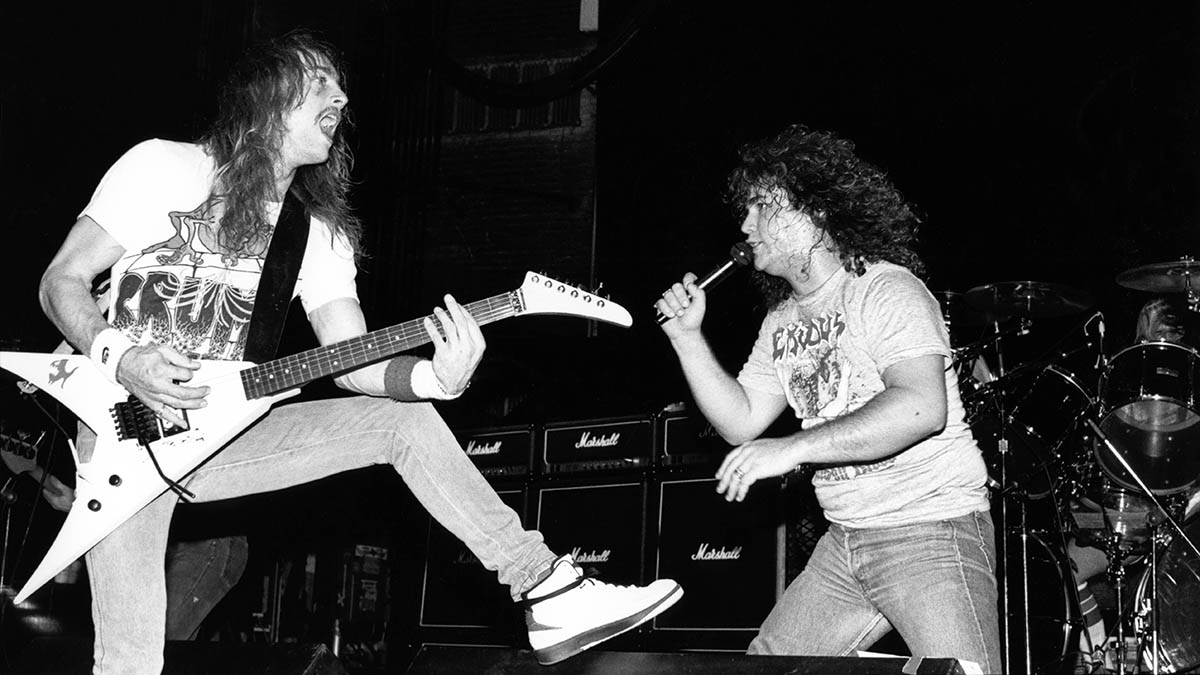
Any chance Rick will play with you on tour this year?
“Probably only for hometown shows. We like to bring Rick out to jam and it’s fun. But Lee [Altus] has been the other guitarist of Exodus [since 2005]. There’s no replacing him. But all the other ex-members are always welcome to jam. We’ve done whole shows based around it before and it’s a lot of fun. I want to do that again.”
On April 13, Tom announced on Facebook that he had squamous cell carcinoma of the stomach, an often deadly form of cancer. Was there any indication that he was sick when you worked on Persona Non Grata?
“Not from the way he was playing. He put on the performance of a lifetime. He just dominated. He was seeing doctors during the recording because he was experiencing unexplained weight loss. He knew something was weird because he was eating normal. Tom’s a big guy and he was weighing in at less than me. He’s four inches taller than me, probably. So he knew something was up, but he didn’t feel sick.”
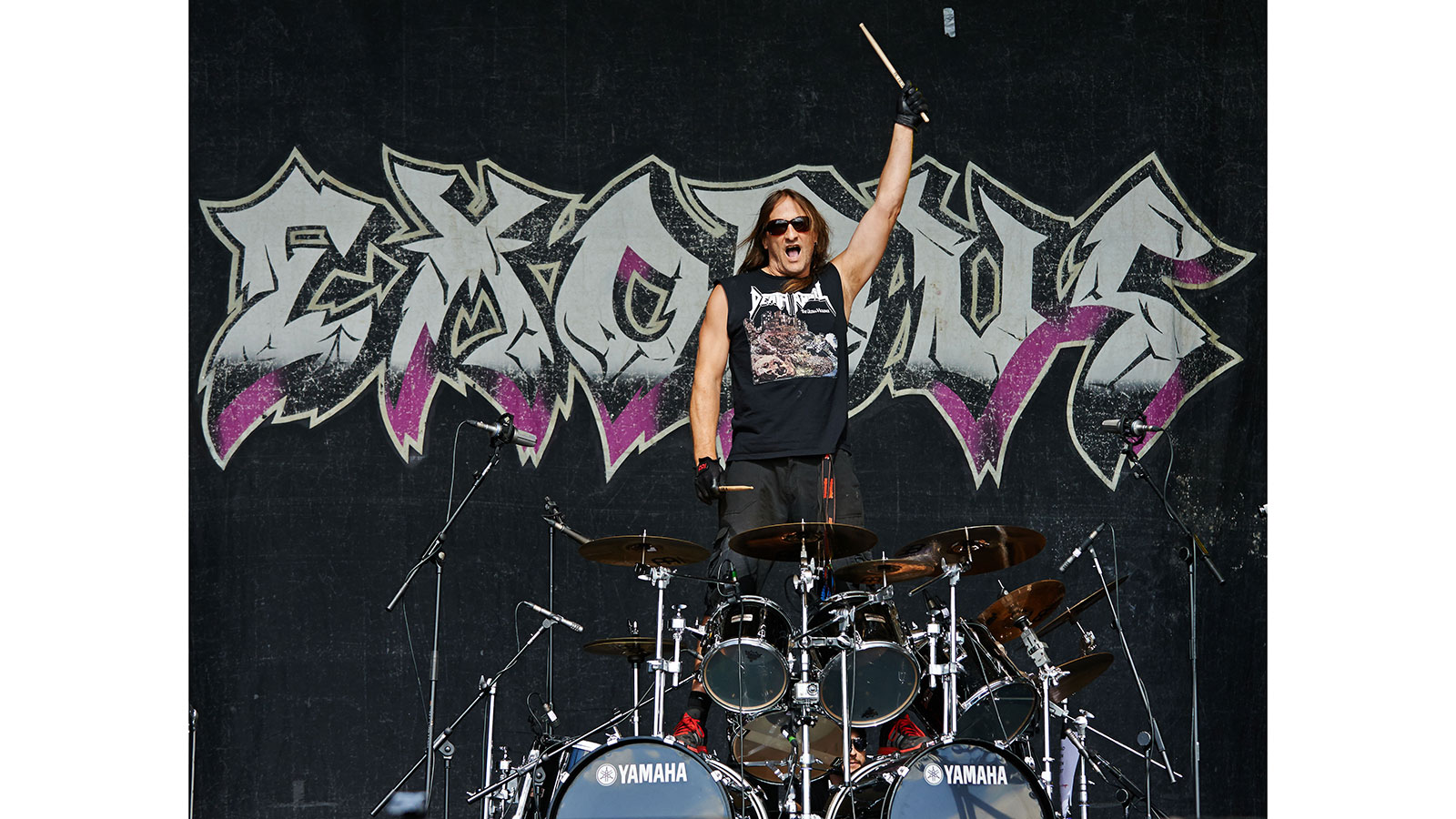
Did he start cancer treatment while he was finishing up the album?
“We were done with the record and then he got some tests. He called me up and gave me the news. I had a total emotional breakdown. He’s my best friend and the prognosis was very grim.
“He went through chemo and he had a gastrectomy [a procedure in which part or all of the stomach is removed]. He was scheduled to do another round of chemo a few months ago and then his doctors told him he didn’t need it. He’s a strong guy and he kicked cancer’s ass and hopefully he stays that way.”
That’s great news. Is he in remission?
“I guess you’d call it remission. He doesn’t need chemo, but they’re giving them immunotherapy because the chemo can break down your immune system.”
He rejoined you onstage at the Aftershock Festival in Sacramento on October 7, 2021.
“He completely destroyed the place. It was dominant, it was emotional and the crowd was insane. We played one of the best 40-minute sets we’ve ever done in our lives.”
About four months before that show you posted on social media that you were giving up alcohol. Why did you decide to quit and has it been a battle to stay on the wagon?
“Here’s the deal. I’m the most positive, upbeat kitten-loving dude you’ll ever find. If you listen to Exodus, it sounds like I need therapy. But the music is my therapy. At first, that’s how I dealt with all the madness of the world. The only thing we had any control over was our creativity. We couldn’t control how bad Covid was or when we could go back on tour or even go to a restaurant. But we could control Exodus and that’s the way I coped at first.”
My wife helped me realize I needed to stop drinking ’cause I was getting depressed, bitter and angry, and that wasn’t me
Then what happened?
“During the summer, I started coping with alcohol and I saw a potential problem coming. I didn’t drink every day, but when I did, I’d get depressed. Before that, I was always a happy drunk. I’d been drinking since I was 16, and in the ’80s we were all way out of control. But in my later years, I chilled out a lot. I never drank much at home. I didn’t even drink that much on tour.
“But during Covid, there I was at home sitting outside in a dark place drinking 12 10-percent alcohol beers – strong shit – and just pounding them. Eventually, my wife helped me realize I needed to stop ’cause I was getting depressed, bitter and angry, and that wasn’t me. And now I’ve never felt better.”
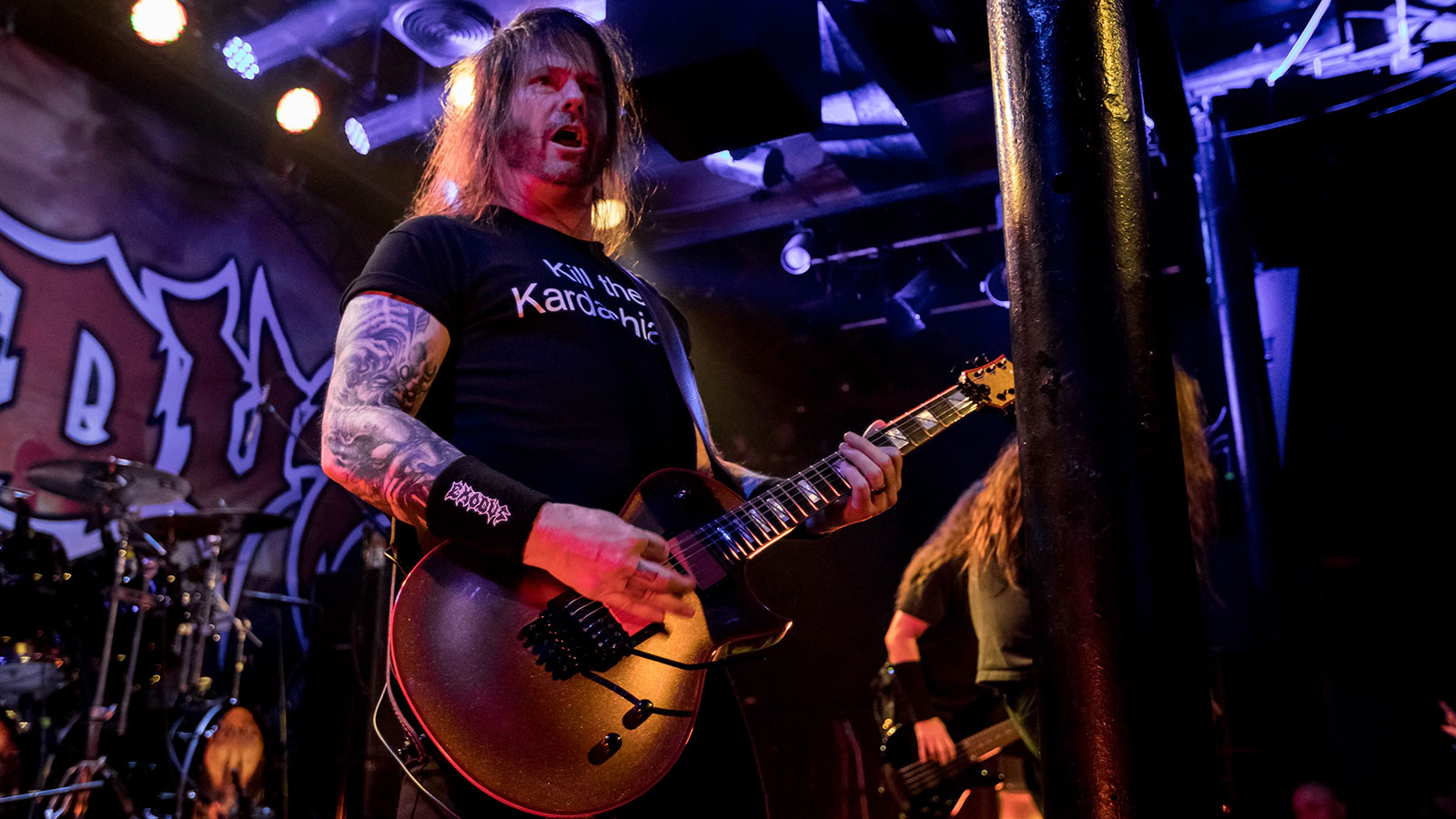
Congratulations. Do you ever get tempted to grab a drink?
“Yeah, but fortunately I’ve found that there’s really excellent alcohol-free beer out there and I found a company that makes a great oatmeal stout. They’ve got other flavors, too. So, if it’s hot outside and I’m craving a beer I’ll just drink that.
“I do not miss getting drunk. I do not miss getting buzzed. I don’t miss the taste of beer because I’m perfectly happy drinking my buzz-free beer. And I didn’t need rehab or anything.”
Is there anything you miss now about Slayer’s demise?
I had one job in Slayer and one job only. Go out, play killer, bang your head and play a little bit of a guitar hero role
“Yeah, man. I’ve been friends with those guys since we were kids. And, I had one job in Slayer and one job only. Go out, play killer, bang your head and play a little bit of a guitar hero role. One thing I was shocked with was how many Slayer solos there are.
“There are songs that I played three solos in and at one point I’d be like, ‘Alright, I’m just going to go shred and play this one behind my head ’cause I’m out of ideas.’ [Laughs] But yeah, it was fun and relatively easy. I wear a lot more hats in Exodus and have a lot more responsibility. Fortunately, I love it – but it’s not always easy.”
For years, Slayer were stone-faced and ruthless onstage. As their career drew to a close, it looked like you all started getting emotional.
“Oh, man. During that last performance of Angel of Death, when I raised my guitar over my head during the solo, I was fighting off tears. That was emotional because I knew that was the last time I was ever going to do it. There were people in the crowd with tears in their eyes at the end of the show, too. And then Kerry does the chain drop at the end of the show. It was the end of an era right then and there.”
Did Slayer stop too soon? That’s for them to decide. I know that’s how Kerry feels. Maybe Tom doesn’t agree
Kerry King has said in interviews that he thinks the band stopped too soon.
“Did the band stop too soon? That’s for them to decide. I know that’s how Kerry feels. Maybe [bassist and vocalist] Tom [Araya] doesn’t agree. I think the band had a lot more music in them, but you know what they say. It’s better to go out too soon than too late.
“The band went out firing on four cylinders. Better to do that than milk it for a few more years when everybody knows you’re milking it. That would tarnish the legacy of the band. This way they went out in peak form. Maybe that’s best.”
- Persona Non Grata is out now via Nuclear Blast.
Jon is an author, journalist, and podcaster who recently wrote and hosted the first 12-episode season of the acclaimed Backstaged: The Devil in Metal, an exclusive from Diversion Podcasts/iHeart. He is also the primary author of the popular Louder Than Hell: The Definitive Oral History of Metal and the sole author of Raising Hell: Backstage Tales From the Lives of Metal Legends. In addition, he co-wrote I'm the Man: The Story of That Guy From Anthrax (with Scott Ian), Ministry: The Lost Gospels According to Al Jourgensen (with Al Jourgensen), and My Riot: Agnostic Front, Grit, Guts & Glory (with Roger Miret). Wiederhorn has worked on staff as an associate editor for Rolling Stone, Executive Editor of Guitar Magazine, and senior writer for MTV News. His work has also appeared in Spin, Entertainment Weekly, Yahoo.com, Revolver, Inked, Loudwire.com and other publications and websites.
“I suppose I felt that I deserved it for the amount of seriousness that I’d put into it. My head was huge!” “Clapton is God” graffiti made him a guitar legend when he was barely 20 – he says he was far from uncomfortable with the adulation at the time
“I was in a frenzy about it being trapped and burnt up. I knew I'd never be able to replace it”: After being pulled from the wreckage of a car crash, John Sykes ran back to his burning vehicle to save his beloved '76 Les Paul
